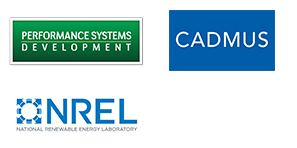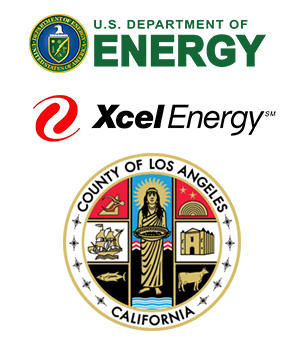
Note: Administrators of energy benchmarking and energy audit mandates can use the OpenEfficiency Platform to streamline their required workflow. The San Francisco Case Study explains how the OpenEfficiency Platform was able to help the cities of San Francisco and Berkeley. The open source tools used are available here. PSD is available to provide support for the configuration and hosting of these open source tools on a fee for service basis. For more information use the contact form. The FAQ and Forum may also provide connections to other users of the platform.
What is The OpenEfficiency Platform?
The pilots explored where these tools could add value and reduce the cost of running energy efficiency programs. The pilots helped inform the development of two open source data management resources, a standardized data model for program reporting that was used to develop a Salesforce “Managed Package”, and an Application Program Interface (API) hub that supports integration of this Managed Package with data coming from the Federal tools. The data taxonomy used in these resources was based on the Department of Energy BEDES data taxonomy project. Links to the resources are provided below.
The following links provide information on the results of the project and the pilots, and they provide access to the technology platform.
Who can benefit from using the OEP?
The project was focused on reducing the cost of program operation and supporting obtaining deeper savings for efficiency programs. The programs addressed in the pilots were administered by a wide range of parties, an investor owned utility (Xcel Energy), an efficiency utility (Efficiency Vermont), a ratepayer funded local government (Los Angeles County and their contractor The Energy Coalition), a public purpose Energy Service Company (Commons Energy) and a municipality administering a benchmarking and audit mandate (City of San Francisco). The project also identified a range of relevant barriers that program administrators encounter in implementing whole building programs and noted how the Federal tools and the OEP technology could be used to address these barriers.
- Assessment of Barriers and Opportunities for Solutions for Whole Building Programs Barriers Report
- San Francisco Pilot Description
- TEC Pilot Description
- Xcel Energy
- VEIC Pilot
- Commons Energy Pilot
Open Source Platform Documentation
Links to the OEP technology resources are maintained in GitHub.
The GitHub site includes the following documentation:
- SEED Benchmark: Dockered MuleSoft API for SEED to Salesforce OEP Managed Package benchmark use case
- This solution includes an Implementation Guide and a User Guide
- Salesforce Package: Salesforce OEP Managed Package that supports efficiency program and benchmark use cases, is BEDES complient, and includes fields mapped from ESPM, EDAPT, and Asset Score
- GBC OAuth 2.0: MuleSoft API OAuth 2.0 example for Green Button Connect (GBC)
- ESPM: MuleSoft API example connection between ESPM and Salesforce
- EDAPT: MuleSoft API example connection between EDAPT and Salesforce
FAQ
OpenEfficiency Platform FAQ & Help Desk
Using DOE Tools to Overcome Whole Building Program Implementation Barriers: Supporting Content
The state of California is a leading implementer of utility energy efficiency programs. The project worked with its California based partners to help move forward the credentialing of Federal tools in California. A report on these activities for use by advocates for energy efficiency in California and other states.
The project team also looked at national market barriers to adoption of these tools and data standards, conducting interviews with various providers and users of simulation tools across the country.
- National Market Report (coming soon)
The project was presented at these conferences:
- ESource
- AESP
- Better Buildings
The project also produced a presentation and peer reviewed paper for the American Council for Energy Efficient Economy Summer Study in 2018.





